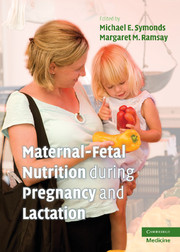Book contents
- Maternal-Fetal Nutrition during Pregnancy and Lactation
- Maternal-Fetal Nutrition during Pregnancy and Lactation
- Copyright page
- Contents
- Contributors
- Section 1 Nutritional regulation and requirements for pregnancy and fetal growth
- Chapter 1 Maternal adaptations to pregnancy and the role of the placenta
- Chapter 2 Pregnancy and feto-placental growth: macronutrients
- Chapter 3 Mineral requirements of the mother and conceptus
- Chapter 4 Individualized growth curves and size at birth
- Chapter 5 Maternal diets in the developing world
- Chapter 6 Preeclampsia
- Section 2 Nutritional regulation and requirements for lactation and infant growth
- Section 3 Specialized requirements
- Index
Chapter 3 - Mineral requirements of the mother and conceptus
from Section 1 - Nutritional regulation and requirements for pregnancy and fetal growth
Published online by Cambridge University Press: 26 February 2010
- Maternal-Fetal Nutrition during Pregnancy and Lactation
- Maternal-Fetal Nutrition during Pregnancy and Lactation
- Copyright page
- Contents
- Contributors
- Section 1 Nutritional regulation and requirements for pregnancy and fetal growth
- Chapter 1 Maternal adaptations to pregnancy and the role of the placenta
- Chapter 2 Pregnancy and feto-placental growth: macronutrients
- Chapter 3 Mineral requirements of the mother and conceptus
- Chapter 4 Individualized growth curves and size at birth
- Chapter 5 Maternal diets in the developing world
- Chapter 6 Preeclampsia
- Section 2 Nutritional regulation and requirements for lactation and infant growth
- Section 3 Specialized requirements
- Index
Summary
- Type
- Chapter
- Information
- Maternal-Fetal Nutrition During Pregnancy and Lactation , pp. 24 - 33Publisher: Cambridge University PressPrint publication year: 2010

